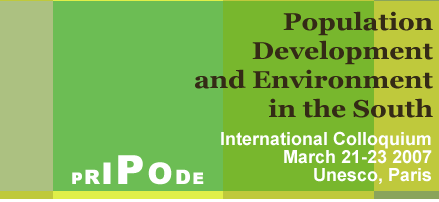 |
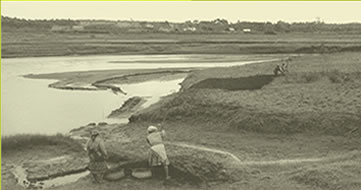 |
||||||
 |
 |
||||||
 |
|||||||
 |
|||||||
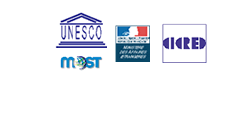 |
|||||||
This Colloquium is organised by the Committee for International Cooperation in National Research in Demography (CICRED) in collaboration with UNESCO, as part of the Programme for International Research on the Interactions between Population, Development, and Environment (PRIPODE).
Sustainable Development lies among the 21st century’s most crucial challenges for humankind. It is closely related to various dimensions of population, regardless of the political, socio-economical or ecological systems prevailing in each region. To a great extent, the prospects for sustainable development depend on the interactions between Population, Development, and Environment (PDE). During the last fifteen years, a wide range of research has been carried out on PDE issues, but so far with limited impact on policy formulation in developing countries. |
 |
 |
In this context, the French Ministry of Foreign Affairs decided in 2002 to fund the Programme for International Research on the Interactions between Population, Development, and Environment (PRIPODE). This programme aims at supporting research conducted in the South. It is coordinated by CICRED with the support of PRIPODE’s international Scientific Committee, which initially selected 20 projects out of the 80 proposals received from countries belonging to the Priority Solidarity Zone defined by the French Government. These projects encompass a broad choice of scientific initiatives on PDE interrelations in developing societies and are conducted in 17 countries (1 in the Caribbean, 2 in Southeast Asia, 3 in the Arab world and 11 in Sub-Saharan Africa). |
PRIPODE’s objectives are to encourage innovative research initiatives from institutions located in the South and to promote a knowledge-based approach to help decision-makers to implement public policies addressing PDE issues at the local or regional level. For the final stage of the programme in 2007, publications, scientific meetings and other planned activities aim at the largest dissemination of research findings, lessons learnt, and good practices based on PRIPODE research.
PRIPODE’s colloquium is intended for the scientific community as well as actors and decision-makers interested by PDE issues in developing countries. The colloquium will be held in both English and French (with simultaneous translation). It will last two days and a half and will be hosted by UNESCO in Paris on 21-23 March 2007. It will bring together PRIPODE programme’s teams selected by the Scientific Committee.
The first three half-days will be devoted to the presentation and discussion of research along the three main themes emerging from PRIPODE research:
The last day of the colloquium will be devoted to a synthesis of the research findings, their implications for policy and analysis, and the prospects for future PDE research. On this occasion, international experts will present the ”state of the art” on PRIPODE’s major themes. Local actors and decision-makers from developing countries will then share their experiences related to PDE interactions. During the next session, the rapporteurs as well the chairman of the PRIPODE’s Scientific Committee and its coordinator will contribute to a synthesis of the colloquium. The day will conclude with a round table bringing together researchers and international actors for a debate on emerging topics related to population-development-environment interactions. |
 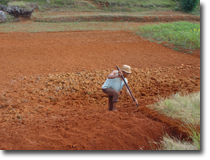 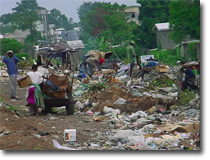 |
Beyond the dissemination of the findings, this colloquium will create an arena for dialogue between scholars, actors and decision-makers from the South and the North and it aims at strengthening the links between research and action in the field of sustainable development. Publication of the proceedings will soon follow the colloquium in 2007.